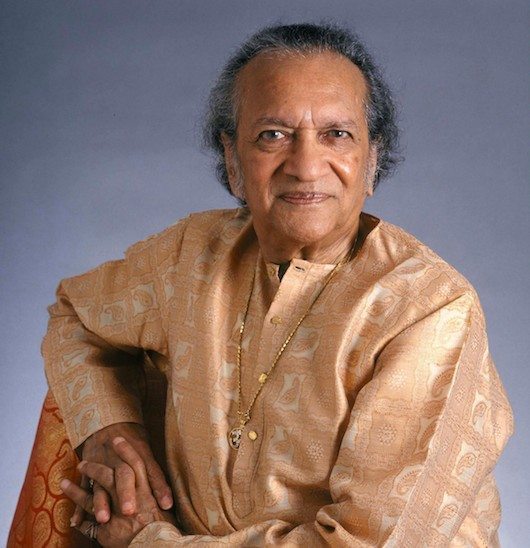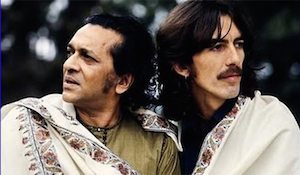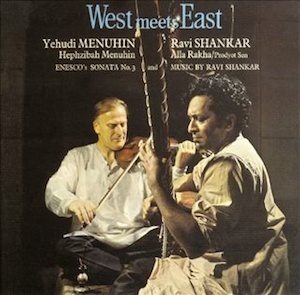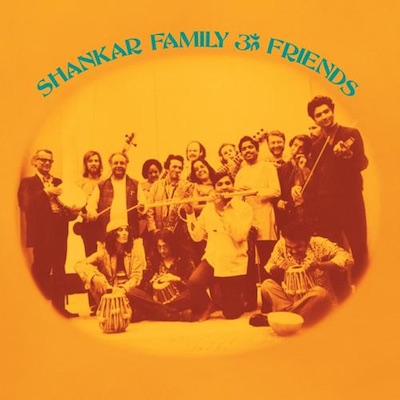
As so often, George Harrison
put it most profoundly. “The first person who ever impressed me in my
life was Ravi Shankar, and he was the only person who didn’t try to
impress me.”
The
master Indian musician, who did more to introduce the music and culture
of his home land than almost any other, was born on 7 April, 1920. We
might add, in his spirit of breaking down barriers between different
backgrounds, that he came into the world in Varanasi, sometimes called
“the Athens of India,” on the day that that Billie Holiday turned five.
 Ravi had decades of important and interesting work to his
name by the time he met, and made such an impression on Harrison in
1966. He had been a member of his brother Uday’s group from the age of
13, and was learning various instruments and travelling with them to
concerts in the United States and elsewhere from the mid-1930s onwards.
Ravi had decades of important and interesting work to his
name by the time he met, and made such an impression on Harrison in
1966. He had been a member of his brother Uday’s group from the age of
13, and was learning various instruments and travelling with them to
concerts in the United States and elsewhere from the mid-1930s onwards.
In the ‘40s, Shankar wrote ballet music, recorded for HMV India and
was music director at AIR, All India Radio, now blending the music of
east and west in his compositions and playing. He travelled to London to
record his first album, Three Ragas, released in 1956, and, as
he toured in Europe and elsewhere, expanded his horizons even further
by writing for non-Indian films.
It was the Byrds who were the first Western pop-rock group to hear
Ravi’s music, and pass it on to their friend George Harrison. The effect
on the deep-thinking George, already in search of spiritual
enlightenment, was immediate and profound. He was playing sitar, on the
Beatles’ Rubber Soul track ‘Norwegian Wood,’ by late 1965, before the pair even met.
 “If you’re trying to find something, to find the source of that is
very difficult,” Harrison said, later quoted in his wife Olivia’s book Living In The Material World.
“But my blessing was to be able to have Ravi as my patch cord, and he
could plug me into the real thing. So my experience of it was always the
best quality.”
“If you’re trying to find something, to find the source of that is
very difficult,” Harrison said, later quoted in his wife Olivia’s book Living In The Material World.
“But my blessing was to be able to have Ravi as my patch cord, and he
could plug me into the real thing. So my experience of it was always the
best quality.”
The pair remained friends for the rest of George’s life, and the
association with such a famous pop musician had a great benefit on
Shankar’s own work. His 1967 LP West Meets East, with another
of his great collaborators, Yehudi Menuhin, won a Grammy for Best
Chamber Music Album and he had three more US chart records in 1967 and
’68, and another in 1973. He added further to the cultural marriage by
playing at Woodstock in 1969, and at Harrison’s Concert For Bangla Desh in 1971.
 When George formed his Dark Horse label, he brought Ravi and his family group to the fold, producing their 1974 album Shankar Family & Friends.
The Indian musician’s achievements continued to be numerous and
awe-inspiring, including playing in the White House and composing
original music for the 1982 film Gandhi, which brought an Oscar nomination.
When George formed his Dark Horse label, he brought Ravi and his family group to the fold, producing their 1974 album Shankar Family & Friends.
The Indian musician’s achievements continued to be numerous and
awe-inspiring, including playing in the White House and composing
original music for the 1982 film Gandhi, which brought an Oscar nomination.
Shankar also brought his great wisdom to bear as a member of the
Indian Parliament from the mid-1980s to the early ‘90s, and wrote two
autobiographies, the second edited by Harrison. Ravi also mentored his
daughter Anoushka, who emerged as a notable sitar player in her own
right, and they toured together. Another daughter, Norah Jones, herself became a world-famous, multi-million-selling success.
His Full Circle album, recorded at Carnegie Hall in New York
in 2000 when he was 80, won a Grammy for Best World Music Album.
Shankar remained active until the very end of his life, playing his
final concert with Anoushka in November 2012, just four weeks before he
passed away at the age of 92. His legacy of musical brilliance, and his
advocacy of tolerance and interaction between religions and cultures,
live on.

No comments:
Post a Comment